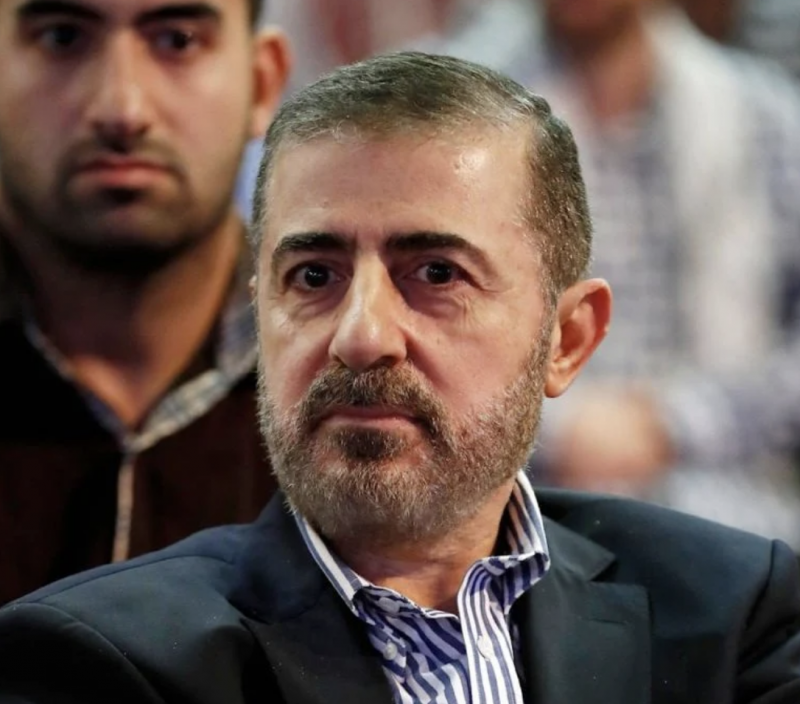
Wafiq Safa participating in the commemoration of Jerusalem Day, July 23, 2017, in the southern suburbs of Beirut. (Credit: AFP)
The news that Wafiq Safa, the head of Hezbollah’s Liaison and Coordination Unit, is on a visit to the UAE came as a bombshell in Beirut. According to the party, this is the first time that a Hezbollah official has visited the UAE.
As a result, there were questions about the potential implications of this major trip. The stated aim of the visit is to follow up on the cases of the seven Lebanese nationals detained in the UAE on suspicion of affiliation with Hezbollah, which the UAE labels as a terrorist group. But there is more to the story.
The detainees’ dossier was dealt with in the past. Six detainees were released a year and a half ago without any Hezbollah officials traveling to the UAE. Others including the former boss of General Security, Abbas Ibrahim, tried to resolve this case, but they did not succeed.
In reality, there are two issues behind Safa’s visit to the UAE. The first — and most important — is linked to the rapprochement between Abu Dhabi and Tehran. This phase began in 2021 and involved opening channels of contact with Hezbollah. The second issue concerns the detainees, as negotiations on this file resumed a few months ago.
The UAE opened up to Hezbollah in 2021. Discussions then began between the two parties through several mediators and led to direct communications through security meetings in Beirut. These meetings focused mainly on the issue of detainees — among other topics linked to the current regional events — as the UAE adopted a policy of rapprochement with Iran and Syria (The UAE embassy to Syria was reopened in 2018).
This policy and the UAE’s desire to bolster its regional presence necessitated a presence in Lebanon. In addition to the issue of detainees, discussions also focused on Abu Dhabi potentially re-joining the Lebanese scene by reopening its embassy in Beirut, which was closed in October 2021 in the wake of a diplomatic crisis between Lebanon and the Gulf states. The UAE’s participation in the oil drilling operations launched in 2022 was also considered. The process was eventually postponed.
In 2023, several convicted prisoners were nevertheless released. At that point, only seven convicts remained behind bars, and their pardon was negotiated nearly six months ago. The UAE was due to reopen its embassy in Beirut against this backdrop. But Hamas’ Operation al-Aqsa Flood had hampered the process.
Hochstein’s wink
Contacts with Hezbollah were nevertheless maintained through Lebanese mediators, as well as via Damascus and Tehran. The conditions have ripened for Safa’s visit to the UAE, following positive signs pointing to the release of the detainees before the end of Ramadan. However, the discussions go beyond this dossier since the UAE seeks to consolidate its presence in Beirut after it promoted its ties with Damascus.
The relationship with Hezbollah is a key element in paving the way for this process, given the party’s role on the Lebanese scene and in regional arenas, including Syria and Yemen. It is against this backdrop that Abu Dhabi’s surprising move should be interpreted along with the indicators for the phase to come.
Safa’s visit pointed to the UAE’s readiness to be more involved in the Lebanese scene and to participate in the investments that Lebanon needs to get back on its feet. The UAE wants to improve its relations with all the Lebanese players, especially as it already has links with most of the Syria-allied forces and has now opened a direct and public channel of communication with Hezbollah.
This dynamic is likely to have a positive impact on the visa issue for Lebanese people and may open up the job market in the UAE to members of the Shiite community. Some time ago, US envoy Amos Hochstein stated that the US is counting on the Gulf states’ support to bolster the Lebanese Army in south Lebanon once the Israel-Hezbollah clashes stop, which would also pave the way for other investments in the country.
Hochstein was probably not referring to Saudi Arabia but to Qatar and the UAE. It is noteworthy that one of the organizers of Safa’s visit is a Lebanese businessman working in the arms industry who has already provided the Lebanese Army with weapons and military supplies.
Assad’s ‘guarantees’
Many Lebanese figures tried to improve Abu Dhabi’s relations with Hezbollah, including a former minister close to Marada Leader Sleiman Frangieh, Hezbollah and the Syrian regime. Moreover, according to information obtained by L’Orient-Le Jour, the Syrian regime was directly involved in the contacts that led to Safa’s visit to the UAE.
“The Syrian president has given guarantees that the visit will have a positive outcome and that the detainees will be released,” said a source close to Hezbollah.
In Beirut, some perceive Safa’s visit to the UAE amid all these regional developments as the start of a new phase in the Gulf countries’ return to Lebanon. “If there is a will, the UAE can take an important place in Lebanon, even if it will take a little time,” said an Arab diplomatic source.
It was reportedly from Abu Dhabi that the name of the former Lebanese ambassador to the Vatican, Georges Khoury, emerged as a consensus candidate for the presidency, and the issue was raised during a visit by caretaker Prime Minister Najib Mikati.
However, the starting point for any arrangement will be the south Lebanon dossier, which is linked to the developments in the Gaza Strip. While discussions are taking place on the post-war period and new governance in the Palestinian enclave, the name of UAE-based former head of Palestinian intelligence, Mohammed Dahlan, has emerged. He held numerous meetings in Doha and Cairo with Palestinian movement leaders based in Qatar. These talks coincided with the Hezbollah-Hamas coordination meetings.
This article was originally published in L'Orient-Le Jour. Translated by Joelle El Khoury.